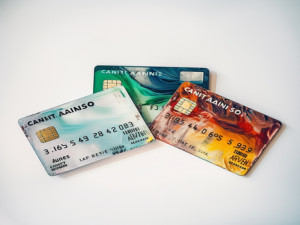
In the fast-paced landscape of today’s world, achieving financial stability can be challenging, especially when unexpected situations result in a less-than-ideal credit score. However, there are options for those seeking to get a personal loan for bad credit.
If you’re on the hunt for the best personal loans for bad credit, you’ve come to the right place. This article will guide you in choosing the best loans, providing crucial information about lenders and what these loans require for your decision-making process.
Bad Credit Lender Details
Avant: Best for quick funding
Avant is a leading financial technology company that specializes in providing accessible and innovative lending solutions. Avant has emerged as a trusted online platform, offering personal loans to individuals seeking financial flexibility.
| Minimum credit score | 550 |
| APR | 9.95-35.99% |
| Terms | 1 to 5 years |
| Origination fee | up to 4.75% |
Happy Money: Best for few fees
Happy Money is a forward-thinking financial wellness platform dedicated to transforming the way people manage their finances and find happiness in their financial lives. Established with a mission to prioritize financial well-being and reduce stress, Happy Money offers a range of tools, resources, and products to help individuals make smarter financial decisions, pay off debt, and achieve financial freedom while fostering a healthier relationship with money.
| Minimum credit score | 640 |
| APR | 11.52%-24.81% |
| Terms | 24 to 60 months |
| Origination fee | 0.00% – 5.00% |
Upgrade: Best for flexible loan amounts
Upgrade is a prominent fintech company that offers a range of financial products and services designed to empower individuals to better manage their finances. Upgrade provides personal loans, credit monitoring, and other tools to help users achieve their financial goals.
| Minimum credit score | 560 |
| APR | 8.49-35.99% |
| Terms | 3 to 7 years |
| Origination fee | 1.85% and 9.99% |
Upstart: Best for thin credit histories
Upstart is an innovative online lending platform that leverages artificial intelligence and machine learning to revolutionize the borrowing experience. Upstart focuses on providing fair and affordable access to credit for individuals. By analyzing various data points beyond traditional credit scores, Upstart assesses a borrower’s creditworthiness more comprehensively, potentially offering better loan terms and rates.
| Minimum credit score | None |
| APR | 4.60-35.99% |
| Terms | 3 to 5 years |
| Origination fee | 0% to 12% |
OneMain Financial: Best for secured loans
OneMain Financial is a well-established American financial services company, with a rich history dating back to 1912. Headquartered in Evansville, Indiana, OneMain specializes in providing personal loans and financial solutions to individuals across the United States. With a strong commitment to helping people achieve their financial goals, OneMain Financial has earned a reputation for accessibility, trustworthiness, and customer-centric services.
| Minimum credit score | None |
| APR | 18.00-35.99% |
| Terms | 2 to 5 years |
| Origination fee | $25 to $500 or 1% to 10% |
LendingPoint: Best for loan-term flexibility
LendingPoint is a prominent financial technology company. Since its founding in 2014, LendingPoint has been dedicated to making personal loans more accessible to a wide range of consumers. They utilize advanced technology and data analytics to assess creditworthiness, providing customized loan solutions to individuals with varying credit profiles. LendingPoint is known for its innovative approach to lending and its commitment to helping customers achieve their financial aspirations.
| Minimum credit score | 660 |
| APR | 7.99-35.99% |
| Terms | 2 to 5 years |
| Origination fee | 0% to 10% |
What are bad credit loans?

Online personal loans, often referred to as bad-credit loans, serve as crucial financial resources for borrowers with lower FICO credit scores. When conventional lenders decline your application, these 24/7 loans step in as a lifeline, offering an avenue for borrowing.
It’s worth noting that bad-credit loans generally entail higher interest rates due to the elevated lending risk. Nonetheless, they present an opportunity to improve your profile through responsible management.
How do bad credit personal loans work?
Obtaining a personal loan with a lower credit score follows a structure akin to that of standard personal loans. The borrower acquires a set sum of money, commits to its gradual repayment alongside interest, and fulfills monthly installments.
The nature of these loans, whether secured or unsecured, hinges on the lending institution’s policies and your creditworthiness. Thus, applying for a bad credit personal loan mirrors the conventional loan process.
Understanding your credit score
Bad credit score is generally numerical gauge of your creditworthiness, measured within the 300 to 850 range. It reflects your financial history, encompassing credit card balances, mortgages, and previous loans.
For those with bad credit, the impact on loan opportunities can be substantial. Traditional lenders often shy away from these borrowers due to the perceived risk of payment defaults.
As a result, loans typically come with higher interest rates, stringent eligibility criteria, and limited loan amounts. Some may even require a minimum credit score of 620.
Understanding that bad credit loans can be a lifeline for people whose credit score is too low, alternative lending options or co-signers might become necessary when seeking mortgages or car loans.
| Borrower credit rating | Score range | Estimated APR |
| Excellent | 720-850. | 14.66%. |
| Good | 690-719. | 17.45%. |
| Fair | 630-689. | 19.87%. |
| Bad | 300-629. | 21.53%. |
What makes up a bad credit score?

How to get a loan with bad credit
Getting such can be challenging, but it’s not impossible. Here’s a step-by-step guide:
-
- Check your credit score:
Begin by obtaining your credit report from the three major credit bureaus (Equifax, Experian, TransUnion) to gauge the impact on your credit.
-
- Find a lender whose credit score assessment is holistic:
When seeking a bad credit loan, it’s vital to locate a lender with a comprehensive credit evaluation approach. These lenders take into account more than just your FICO score; they also assess factors like your employment history, income, and recent financial stability. By finding such a lender, you increase your chances of getting a loan if you have bad credit.
-
- Prequalify for loans online:
To gauge your loan eligibility without impacting your credit, consider online prequalification tools offered by lenders. These tools, often provided by lenders specializing in bad credit loans, allow you to assess potential loan offers based on your credit score. This way, you can explore your options discreetly before committing to a formal application, a valuable step when dealing with banks and credit.
-
- Compare loan offers:
When you’re dealing with bad credit, it’s essential to compare loan offers from different personal loan lenders. Take your time to shop around and carefully assess the details, including interest rates, loan terms, and associated fees. This approach is particularly crucial because a loan is typically influenced by your credit situation.
-
- Submit an application:
After selecting a lender that specializes in offering personal loans to borrowers with less-than-ideal credit, it’s time to finalize your application. Ensure you provide all the required documentation and information to proceed with your loan request. This step not only helps you secure the loan but can also be a valuable opportunity to boost your credit if managed responsibly.
Where to find bad credit loans?
Many individuals find themselves with less-than-perfect credit scores, which can pose challenges when they need to qualify for a personal loan with bad credit score. However, don’t despair; there are several avenues you can explore to secure a personal loan, even if your credit score is less than ideal.
We’ll highlight their unique features and advantages, all while addressing how these choices can impact your credit score. Discover the path to financial flexibility, regardless of your credit background.
Banks

Credit Unions
Credit unions, as member-owned, not-for-profit financial cooperatives, are known for their flexibility when it comes to lending. Unlike traditional banks, credit unions tend to have more lenient lending criteria, making them a viable option for people with bad credit.
They may offer loans specifically designed for borrowers with credit challenges, often featuring lower interest rates. Additionally, credit unions are often willing to collaborate with their members to establish repayment terms that align with their financial situations. Keep in mind that becoming a member of a credit union may be a requirement to access these services.
Online Lenders
Online lenders have revolutionized the lending industry, providing a convenient and accessible way to obtain bad credit loans. These lenders often consider alternative factors beyond credit scores when making lending decisions.
They offer a variety of loan types, and the application process is typically quick and straightforward. However, borrowers should exercise caution and research the legitimacy of online lenders to avoid scams and predatory lending practices.
Types of loans for bad credit
Secured loans
Secured loans, often requiring collateral such as a home or car, provide a potential solution for individuals whose credit score isn’t ideal. These loans are determined based on your credit and the value of your collateral.
While they offer higher approval chances for those with bad credit, it’s essential to understand the risks involved. If you fail to make payments, the lender has the right to seize the collateral, potentially leading to the loss of your valuable assets.
Additionally, it’s worth noting that interest rates on secured loans may be higher compared to other options available for borrowers with improved financial background.
Best for Secured Loans:
-
- Individuals with bad credit who can provide valuable collateral.
-
- Those looking to borrow larger sums of money.
-
- People seeking lower interest rates compared to unsecured loans.
What to like about Secured Loans:
-
- Higher approval rates for borrowers with bad credit.
-
- Potentially lower interest rates due to reduced lender risk.
-
- Access to larger loan amounts.
What to watch out for with Secured Loans:
-
- The risk of losing the collateral if payments are missed.
-
- Higher stakes and potential long-term financial repercussions.
-
- Interest rates may still be relatively high for those with very bad credit.
Unsecured loans
Unsecured loans, unlike secured ones, don’t require collateral, making them an accessible option for individuals seeking online personal loans for bad credit.
These loans are primarily determined based on your creditworthiness and income, rather than assets. While securing approval for unsecured loans can be more challenging for those with poor credit, they offer valuable flexibility without the need to risk valuable assets as collateral.
However, it’s important to note that interest rates may be higher due to the increased risk for lenders. If your credit is on the mend, you may qualify for lower rates over time by taking steps to improve your credit score. Additionally, consider obtaining a free copy of your credit report to better understand your financial standing.
Best for Unsecured Loans:
-
- Individuals and no collateral to offer.
-
- Borrowers seeking smaller loan amounts.
-
- Those who need quick access to funds without asset risk.
What to like about Unsecured Loans:
-
- No collateral needed, reducing the risk of losing assets.
-
- Accessible for individuals with bad credit.
-
- Quick approval and funding in some cases.
What to watch out for with Unsecured Loans:
-
- Higher interest rates compared to secured loans.
-
- Stricter credit requirements, making approval more challenging.
-
- Potential for accumulating debt if not managed responsibly.
Payday loans

Furthermore, applying for a payday loan typically involves a soft credit inquiry, which means it won’t lower your credit score during the application process. However, it’s crucial to use these loans wisely, as they may not be suitable for long-term financial needs.
Best for Payday Loans:
-
- Individualsfacing urgent financial emergencies.
-
- Those who need immediate access to small sums of money.
What to like about Payday Loans:
-
- Quick and easy application process.
-
- Approval regardless of credit history.
-
- Convenient for unexpected expenses.
What to watch out for with Payday Loans:
-
- Exorbitant interest rates, leading to a debt cycle.
-
- High fees and finance charges.
-
- Potential for predatory lending practices.
Cash advances
Cash advances are short-term financial options available through credit cards or specialized lenders. These options enable borrowers to access quick funds by either withdrawing cash from their credit card limit or securing a rapid loan.
It’s worth noting that while cash advances can be a convenient way to obtain immediate funds, they typically come with high interest rates and associated fees. If your credit score is generally low, you may qualify for lower credit limits on your credit card, potentially limiting the amount you can access using a bad credit loan.
As with any financial product, it’s crucial to use cash advances sparingly, as overuse may lead to a dip in your credit score. Additionally, exploring alternatives to bad credit loans, or seeking loans from lenders that offer bad credit options, could be a prudent financial strategy.
Best for Cash Advances:
-
- Individuals in need of quick cash for unexpected expenses.
-
- Those who can pay off the advance promptly.
What to like about Cash Advances:
-
- Immediate access to funds.
-
- No credit check for credit card cash advances.
-
- Convenience in emergencies.
What to watch out for with Cash Advances:
-
- High interest rates and fees, making them costly.
-
- Risk of accumulating credit card debt.
-
- Not a sustainable solution for long-term financial needs.
Bank agreements
Bank agreements encompass the contractual terms and conditions established by a financial institution when extending a loan. These written agreements comprehensively detail crucial aspects such as interest rates, repayment schedules, and, if applicable, any collateral requirements.
Having a firm grasp of these agreements is essential for borrowers to ensure they meet the stipulated terms and steer clear of any potential penalties or consequences. Keep in mind that the minimum credit score requirement may vary depending on the type of loan, and joint personal loans may provide an option for borrowers with bad credit to improve their chances of approval.
Understanding the nuances of these agreements is fundamental for borrowers, as they typically require a credit commitment and compliance with the lender’s specific terms and conditions.
Best for Bank Agreements:
-
- Borrowers seeking clarity on loan terms and conditions.
What to like about Bank Agreements:
-
- Clear delineation of loan terms, interest rates, and repayment obligations.
-
- Provides legal protection and ensures transparency.
What to watch out for with Bank Agreements:
-
- Possible complex legal language, requiring careful examination.
-
- Penalties for non-compliance with terms outlined in the agreement.
-
- Potential for hidden fees or terms that could be financially burdensome.
Bad credit home equity loans
Home equity loans are a specific type of secured loan where the borrower’s home equity serves as collateral. These loans are designed to assist individuals with less-than-ideal credit scores who own a home.
They provide a potential avenue for accessing funds for various purposes. However, it’s important to note that because of the collateral involved, the interest rates on these loans may be higher for borrowers with a bad credit background.
Additionally, borrowers should be aware that they risk losing their homes if they default on payments, underscoring the importance of responsible financial management when considering this option.
Best for Bad Credit Home Equity Loans:
-
- Homeowners in need of substantial funds.
-
- Those looking to consolidate debt or make home improvements.
What to like about Home Equity Loans:
-
- Access to larger loan amounts compared to unsecured loans.
-
- Potentially lower interest rates due to collateral.
-
- Interest may be tax-deductible (consult a tax advisor).
What to watch out for with Home Equity Loans:
-
- Risk of losing one’s home if unable to make payments.
-
- Closing costs and fees associated with the loan.
-
- Default can have long-lasting financial repercussions.
HELOC loans for bad credit
HELOC (Home Equity Line of Credit) loans enable homeowners to leverage their home equity as collateral, providing them with a means to get a bad credit loan funds when needed.
These versatile loans cater to homeowners with less-than-ideal credit, offering a flexible solution for those who require periodic access to funds. HELOCs typically feature variable interest rates and revolving credit lines, which can be advantageous for borrowers who may qualify for lower rates despite having a bad credit background.
Best for HELOC Loans for Bad Credit:
-
- Homeowners needing ongoing access to funds for various expenses.
What to like about HELOC Loans for Bad Credit:
-
- Flexibility to borrow and repay as needed.
-
- Lower interest rates compared to some other types of loans.
-
- Potential tax benefits (consult a tax advisor).
What to watch out for with HELOC Loans for Bad Credit:
-
- Risk of losing one’s home if unable to make payments.
-
- Variable interest rates can lead to payment fluctuations.
-
- The temptation to overspend and accumulate more debt.
Student loans for bad credit
-
- Individuals with bad credit pursuing higher education.

What to like about Student Loans for Bad Credit:
-
- Access to education funding despite poor credit.
-
- Opportunity to improve credit through responsible repayment.
-
- Various repayment options, including income-driven plans.
What to watch out for with Student Loans for Bad Credit:
-
- Potential need for a co-signer with good credit.
-
- Higher interest rates compared to federal student loans.
-
- Risk of accumulating significant student loan debt.
Pros and cons of bad credit loans
| Pros of Bad Credit Loans | Cons of Bad Credit Loans |
|---|---|
| Access to Funds: They provide access to much-needed funds for individuals with poor payment history. | Higher Interest Rates: Bad credit loans often come with higher interest rates, resulting in increased overall borrowing costs. |
| Improved Credit: Responsible repayment can help rebuild and improve credit scores over time. | Limited Loan Options: Borrowers with bad credit may have fewer loan options and may need to settle for unfavorable terms. |
| Collateral Options: Secured bad credit loans allow borrowers to use collateral, which can lead to better terms and larger loan amounts. | Risk of Asset Loss: Secured loans put collateral at risk, potentially resulting in the loss of valuable assets. |
| Tailored for Specific Needs: Bad credit loans come in various types, offering solutions for different financial needs. | Predatory Lenders: Some lenders may take advantage of borrowers with poor credit, leading to predatory lending practices. |
| Quick Approval: Online lenders often offer quick approval and funding, addressing urgent financial needs. | Debt Accumulation: Borrowers may accumulate more debt if they fail to manage the loans responsibly. |
| Alternative Factors Considered: Some lenders consider factors beyond credit scores, increasing approval chances. | Limited Loan Amounts: Loan amounts for bad credit loans are often capped, restricting access to substantial funds. |
| Flexible Repayment: Some bad credit loans offer flexible repayment terms to accommodate borrowers’ financial situations. | Fees and Charges: Borrowers may face high fees and additional charges, increasing the cost of borrowing. |
How to compare bad credit loans
1. Check the borrowing requirements
Credit Score:
A credit score is a numerical representation of an individual’s creditworthiness. It reflects their credit history, payment behavior, and financial responsibility. Lenders use credit scores to assess the risk associated with lending to a borrower. Higher scores indicate better creditworthiness.
Debt-to-Income Ratio (DTI):
The debt-to-income ratio (DTI) is a financial metric that compares a person’s monthly debt payments to their monthly income. It helps lenders evaluate a borrower’s ability to manage additional debt. A lower DTI is generally favorable.
Co-Applicant and Collateral:
A co-applicant is an additional person who applies for a loan or credit together with the primary borrower. They share responsibility for the debt and can strengthen the application. Collateral refers to assets pledged to secure a loan, which can reduce the lender’s risk but may be at risk if the borrower defaults.
2. Review the annual percentage rate
The annual interest rate on bad loans, often referred to as the Annual Percentage Rate (APR), represents the cost of borrowing over one year.
For bad credit loans, APRs tend to be higher than those for loans with better credit terms. These rates are determined based on the borrower’s creditworthiness and the lender’s policies. Higher risk associated with bad credit borrowers typically results in elevated APRs, increasing the overall cost of borrowing.
3. Account for fees
A commission account for fees is a financial account where fees or service charges are accumulated and managed. It’s commonly used in businesses, financial institutions, or service providers to track income generated from fees, such as transaction fees, service charges, or commissions. This account helps organizations keep accurate records of their fee-based revenue and ensures that these funds are appropriately allocated or reinvested into the business operations.
3 common personal loan fees:
| Late payment fee | This fee is charged when you fail to make your loan payments on time. It’s important to adhere to the loan’s repayment schedule to avoid incurring late payment fees. |
| Loan origination fee | This upfront fee covers the cost of processing your loan application and is typically a percentage of the loan amount. It’s deducted from the loan proceeds. |
| Prepayment penalty | Some loans have prepayment penalties, which are fees charged if you pay off your loan before the agreed-upon term. Be aware of these penalties when considering early loan repayment. |
4. Calculate the monthly payments
To calculate the annual interest rate (APR) on a loan, follow these steps:
-
- Gather loan details: Collect the loan principal amount, the total interest paid over the loan term, and the loan term in years.
-
- Divide total interest by principal: Divide the total interest paid by the loan principal to get the decimal interest rate.
-
- Multiply by 100: Multiply the decimal interest rate by 100 to convert it into a percentage.
The result is the annual interest rate (APR) as a percentage, which reflects the cost of borrowing over a year.
How to spot scams for bad credit loans
Recognizing fraud from dubious lenders is crucial to protect yourself from financial scams. Here are signs to watch for:
-
- Unsolicited Offers: Be wary of lenders who contact you out of the blue, especially through unsolicited emails, calls, or text messages. Legitimate lenders usually don’t initiate contact without a prior inquiry.
-
- No Physical Address or Contact Information: A reputable lender should have a physical address and clear contact details. If this information is missing or hard to find, it’s a red flag.
-
- Too-Good-to-Be-True Promises: Be cautious of lenders who promise guaranteed approval, exceptionally low interest rates, or loans without credit checks. If an offer seems too good to be true, it likely is.
-
- Upfront Fees: Legitimate lenders typically don’t require upfront fees to process a loan application. If you’re asked to pay fees before receiving a loan, it’s likely a scam.
-
- Pressure to Act Quickly: Fraudulent lenders may pressure you to make fast decisions, often using tactics like “limited-time offers.” Take your time to research and make an informed decision.
-
- Unclear Terms and Conditions: Review the loan agreement carefully. Dubious lenders may hide unfavorable terms, fees, or penalties in the fine print. Ensure you understand all the terms before proceeding.
-
- No Physical Presence: Be cautious of lenders with no physical office or a legitimate online presence. Check for a website with secure features and customer reviews.
-
- Lack of Licensing: Verify that the lender is properly licensed to operate in your state or country. Unauthorized lenders are likely scams.
-
- Inconsistent Information: If the lender’s information doesn’t match what’s publicly available or if their communication is riddled with spelling and grammatical errors, it’s a warning sign.
-
- Trust Your Instincts: If something doesn’t feel right or if the lender is evasive when you ask questions, trust your instincts and consider seeking loans from reputable financial institutions or lenders with a known track record.
What to do if you’ve been scammed
If you believe you’ve been deceived by a creditor, take these steps:
-
- Gather Documentation: Collect all loan documents, correspondence, and records related to the deception.
-
- Contact the Creditor: Communicate with the creditor to address your concerns and seek resolution.
-
- File a Complaint: If the issue remains unresolved, file a complaint with relevant authorities, such as the Consumer Financial Protection Bureau (CFPB) in the United States.
-
- Seek Legal Advice: Consult an attorney experienced in consumer protection laws to explore legal options.
-
- Monitor Your Finances: Continuously monitor your accounts and credit reports for irregularities and unauthorized activity.
Alternatives to high-interest loans for bad credit
Family loan
A family loan is a financial arrangement where one family member lends money to another within a familial relationship. To apply for a family loan, both parties should agree on loan terms, including the amount, interest (if any), and repayment plan. It’s advisable to draft a formal agreement to avoid misunderstandings.
Payment plan for bills
To request an extension or enroll in a hardship program for rent, utilities, or credit card payments, contact the respective service provider or creditor. Explain your financial difficulties and inquire about available options. Prepare documentation of your hardship, such as income statements or medical bills, to support your request. Be proactive and communicate early to find a suitable solution.
Local nonprofits or charities
In challenging financial situations, it’s essential to have a plan. If you find yourself unable to repay your loan, don’t despair. Consider these steps:
-
- Assess Your Situation: Understand your financial standing and why you can’t repay the loan.
-
- Contact Your Lender: Reach out to your lender to discuss your circumstances. They may offer alternatives.
-
- Explore Charitable Assistance: In cases of extreme hardship, remember that you can seek help from charitable organizations.
-
- Seek Professional Guidance: Financial advisors can provide valuable insights and strategies for managing your debt.
By taking these steps, you can navigate financial difficulties with confidence and explore options that suit your situation. Remember, help is available when you need it most.
Medical bill assistance
Understanding the impact of medical bills on borrowers can enable lenders to offer compassionate solutions. By recognizing the stress and urgency these bills create, lenders can provide flexible repayment plans, lower interest rates, or extended grace periods. This proactive approach fosters trust and eases the financial burden for borrowers.
Frequently asked questions
Can I get a loan with bad credit?
Yes, you can get such loan, but it might come with higher interest rates and stricter terms. Consider building your credit or exploring alternative lenders.
What is the easiest way to get a loan with bad credit?
The easiest way to get such loan is to apply for a secured loan, like a car title loan or a secured credit card. Alternatively, consider lenders or credit unions that specialize in bad credit loans.
How can I get a loan for bad credit?
To get a loan for bad credit, start by checking your credit report for errors, improving your credit score if possible, and exploring options like personal loans from lenders or loans from credit unions.
Where can I get a loan for bad credit?
You can get a loan for bad credit from lenders, credit unions, or even some traditional banks that offer bad credit loan programs. Compare options and choose one that suits your needs.
